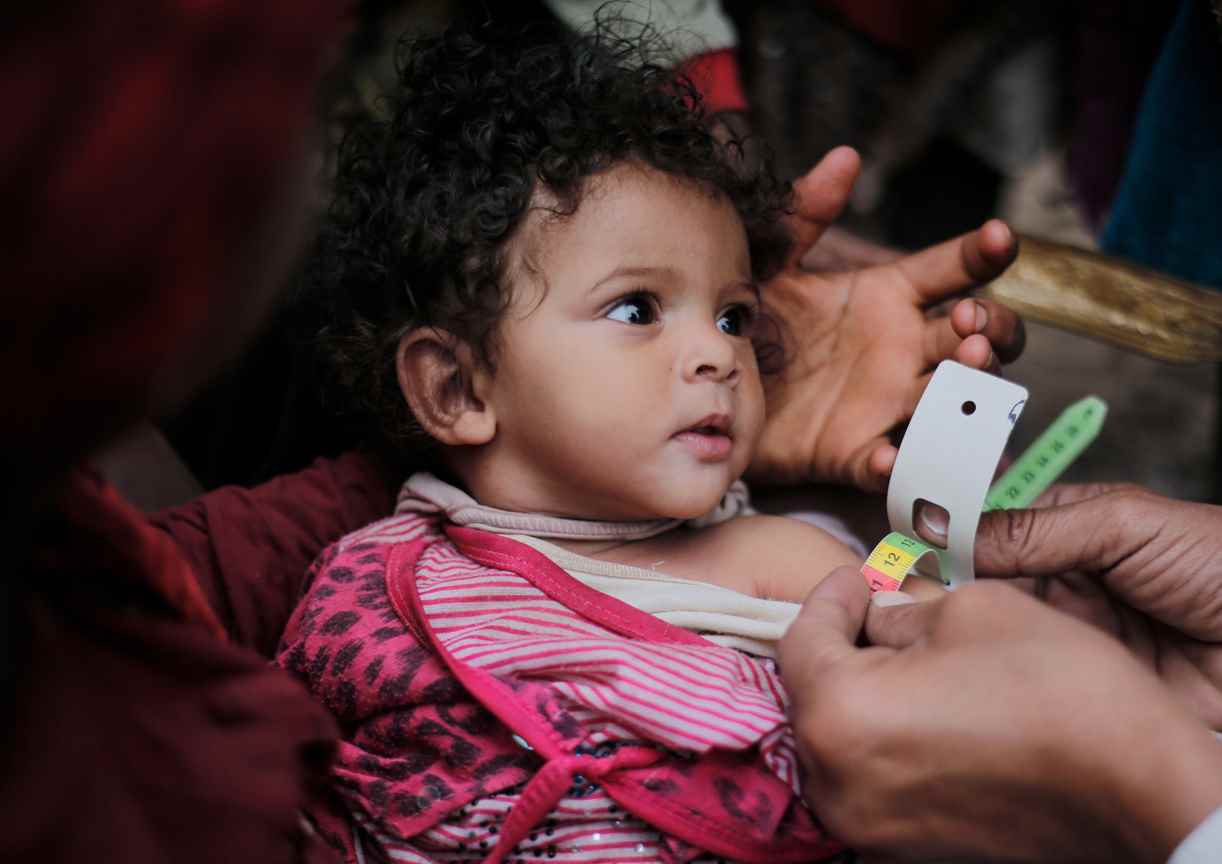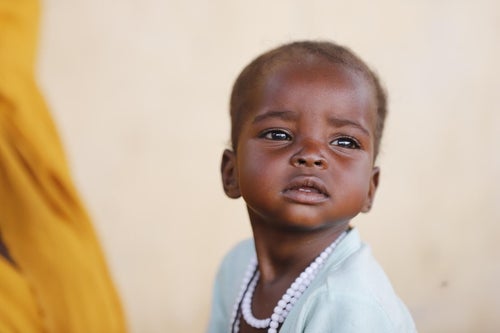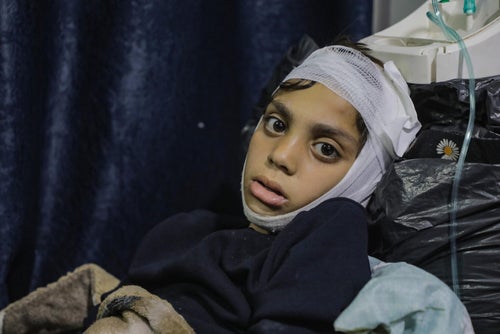For the first time in history, children are facing the threat of four famines striking at once.
But you'd be forgiven for not knowing - it's hardly made the headlines.
It’s hard to imagine the horror and chaos of the Nepal earthquakes or the Ebola crisis not reaching our television screens.
Yet, as you read this, four grave emergencies are forcing 1.4 million children straight into the path of a painful death from malnutrition. Four countries - South Sudan, Nigeria, Somalia and Yemen are on the brink of famine.
You would barely know it from watching the news. You also wouldn’t know the phenomenal lengths their parents will go to for their safety; the sheer strength of the human spirit against unspeakable dangers.
Read on for news that you might not find in your newsfeed.
A generation of children in Yemen could be stunted - if they survive
In 2017, UNICEF is working to reach 3.1 million children around the world with emergency care for severe acute malnutrition. Nearly half a million of them are in just one country: Yemen.
Brutal conflict has plunged what was already the Middle East’s poorest country into an unprecedented malnutrition crisis. Violence and the destruction of ports have driven food and fuel imports to a dangerous low and child hunger to an all-time high. It’s estimated that one child in Yemen dies every ten minutes from a preventable disease.
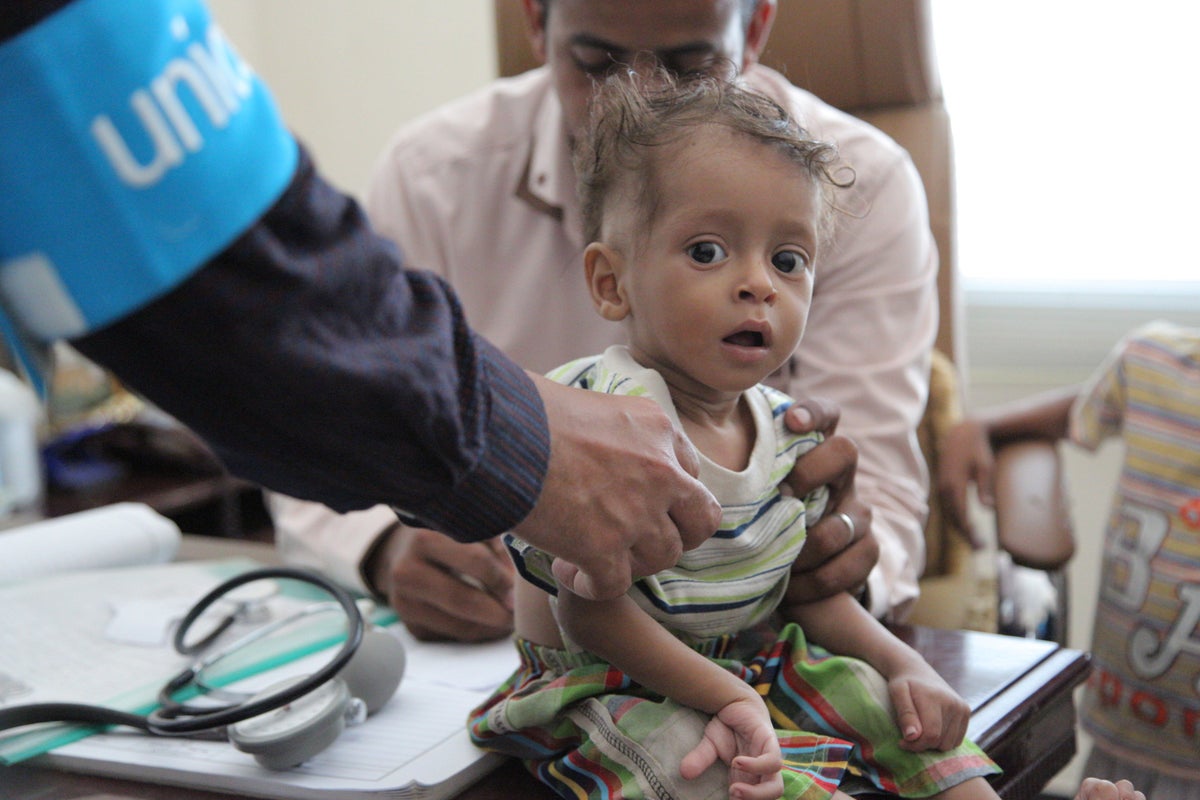
UNICEF is helping children in Yemen on a massive scale. In a five-day nationwide campaign in September 2016, UNICEF mobilised thousands of health workers to reach the vulnerable children and new mothers missing out on care. Traveling in cars, on motorcycles, by donkey or on foot, mobile teams reached more than 600,000 children under five in remote areas with malnutrition screening and micronutrients.
This year, families in Yemen who are already struggling with poverty will now face bombs, drought and extreme food shortages. For the 70 per cent of the population in need of humanitarian assistance, the world’s attention, empathy and emergency aid would make that bleak future easier to face. Even if the media is quiet - you can help bring critical attention to the emergency in Yemen by spreading the news.
Abduction isn’t the only threat to children in Nigeria
You might remember the horrifying abduction of 270 Nigerian schoolgirls by terror group Boko Haram in 2014. It sent shockwaves across the world and swept social media with a movement calling to #BringBackOurGirls.
Years on, three-year-old Zainab is carrying the forgotten burden of Boko Haram’s violence: malnutrition. It’s his first trip to a UNICEF-supported health centre and a visit that could save his life. Without treatment, one in five children with severe acute malnutrition don’t make it. Even the children who survive can feel the impact for a lifetime, as stunted growth and brain development trap them in poor health and poverty.
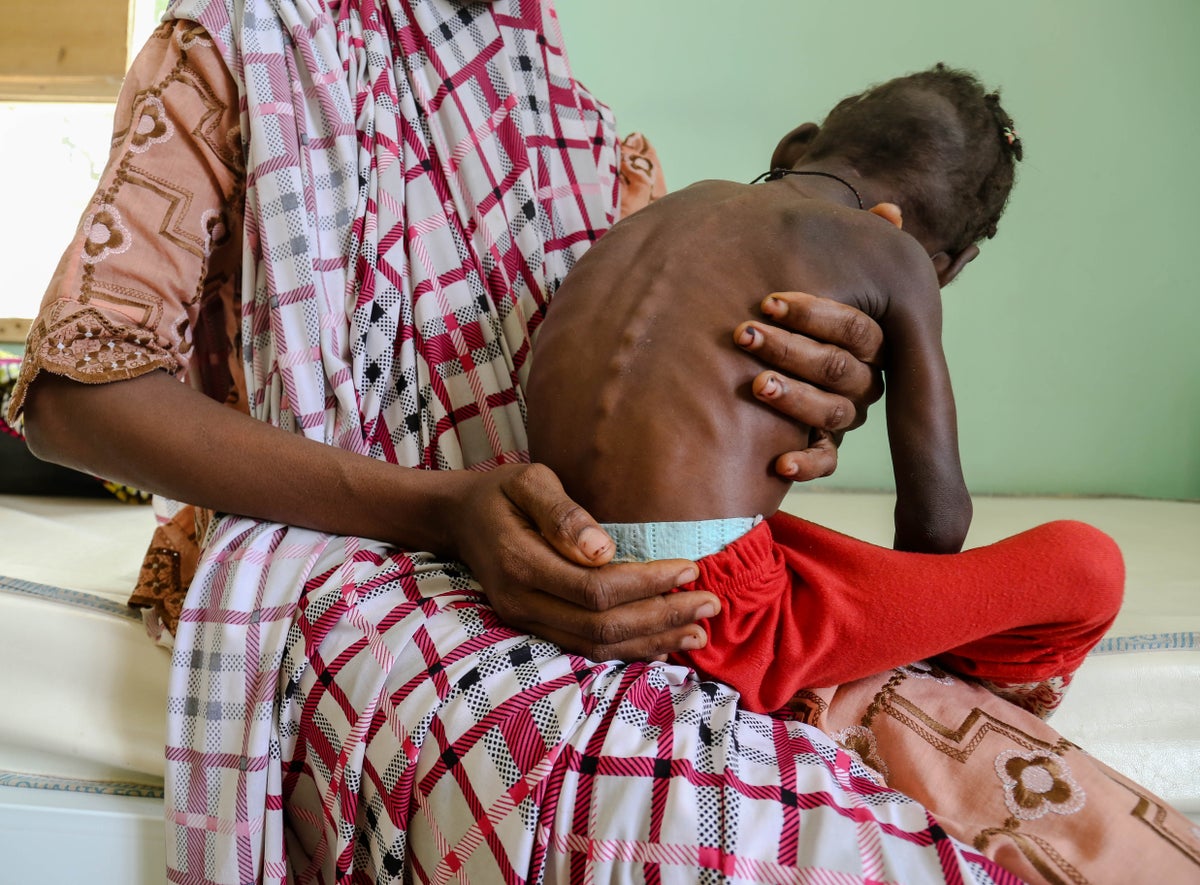
Thankfully, Zainab is one of 115,000 children under five who UNICEF helped treat for severe acute malnutrition in Nigeria last year. Ongoing violence means that this year, we need to treat twice as many children for this deadly disease. Conflict has ravaged Nigeria’s food security, disrupting farming, wiping out crops and livestock, depleting stocks and destroying water and health facilities. Families are running out of options to keep their children safe and healthy.
In the worst hit Nigerian states, more than 400,000 children are at risk of death from severe acute malnutrition. If the horrifying reality of this starvation could capture the attention of newspapers and social media users like the campaign to #BringBackOurGirls, we could make sure no child is left behind. You can help give this crisis the attention it needs by sharing this blog on Facebook or Twitter.
Famine struck South Sudan
Famine is not a word UNICEF takes lightly. It means families are facing extreme food shortages, one third of young children are acutely malnourished and people are starving to death. This dire situation was officially declared in February 2017 South Sudan's Unity State - the first time famine struck anywhere in the world since 2011.
Thankfully, by June, famine had eased but children in the world’s youngest country are facing a hellish combination of violence, extreme weather and a collapsing economy.
Brutal fighting and a severe dry season have stopped many farmers from planting crops and forced others to abandon their harvests. With inflation as high as 800%, families are struggling to afford even basic staples and resorting to ‘wild foods’ like grass and seeds. Some parents have had to sell everything just to survive; they’ve fled home without warning and seen their villages burnt to the ground.
Food shortages are taking over the country: 290,000 children have severe acute malnutrition, the worst kind of the disease.
Mothers like Athill are being forced to make choices they’d never dreamt of. Her entire family relies on grass seeds for survival. The seeds have low nutritional value and many of her family, including the adults, are severely malnourished.
"I do try and get work in the local market to buy food but there just isn’t any work,” says her husband Adim. “I am afraid all the time that if we have no rain, there soon won’t be even the grass seed to feed the family and we will starve all over again. I can’t afford to send any of my children to school. My main priority is to try as best I can to feed my family.”
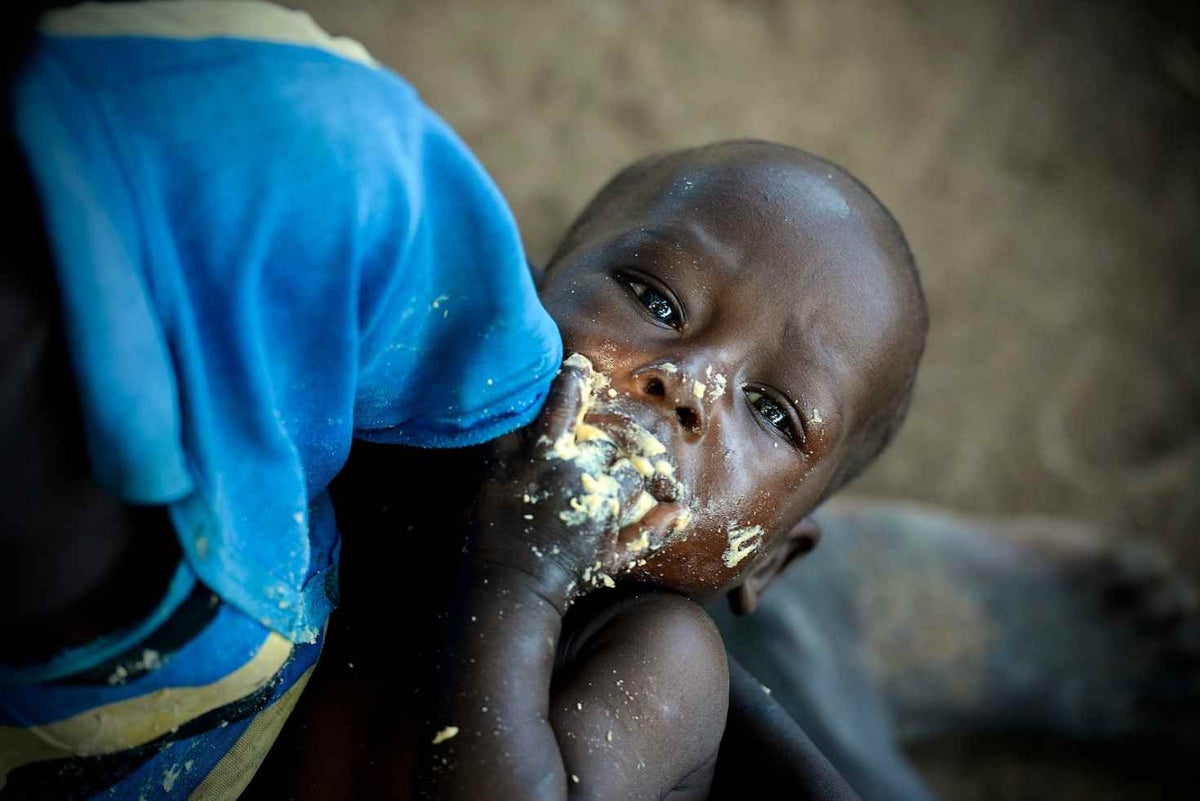
UNICEF is providing the little, powerful things that save lives in a crisis. In rural areas of South Sudan, UNICEF gives parents therapeutic food they can take home to treat their children’s malnutrition themselves. The high-calorie peanut paste has already helped thousands of children to survive, recover and grow strong again.
But as brutal conflict tears through South Sudan, children’s needs are growing. The declaration of famine in parts of the country - a huge announcement with global significance - generated little media interest.
If the world doesn’t take notice, one million more people could be hit next. We can’t let that happen. It’s up to us to spread the news about this crisis. Take this into your own hands: share this blog with other passionate Australians who care about children.
Climate change is already threatening Somalia
Conflict and climate change are driving more children from their homes than ever before. Somalia is facing both problems, with a million people displaced in the search for safety, water and food. Communities battered by decades of conflict are being uprooted and forced to walk long distances just to survive the devastating drought.
Children suffer the most: water shortages have hiked prices, triggered outbreaks of deadly water-borne diseases and left children struggling to recover from malnutrition. 150,000 are already severely malnourished and this could rise rapidly if we don’t act fast.
Even if it rains, the worst may be yet to come for children in Somalia. UNICEF isn’t waiting to act. We’re reaching children with therapeutic food, micronutrients and antibiotics. Malnutrition can be deadly but this treatment works: 93% of children UNICEF treated for severe acute malnutrition in 2016 recovered.
Our teams are working incredibly hard but without the support of the global community they may not be able to reach every child who needs our help. For too many children, time is simply running out.
Be there even when the newspapers aren’t
There is hope for children in South Sudan, Yemen, Somalia and Nigeria. From across the world in Australia, there’s something powerful we can do: donate to help UNICEF teams deliver life-saving treatment for malnutrition, safe water and vaccines.
UNICEF teams work tirelessly but depend on donations to keep going. We don’t receive any funding from the UN and 77 cents from every dollar we raised in 2015 went directly to our work for children.
Be there for a child facing deadly malnutrition. Make a donation to UNICEF today and stop famine in its tracks.
Related articles
Stay up-to-date on UNICEF's work in Australia and around the world



